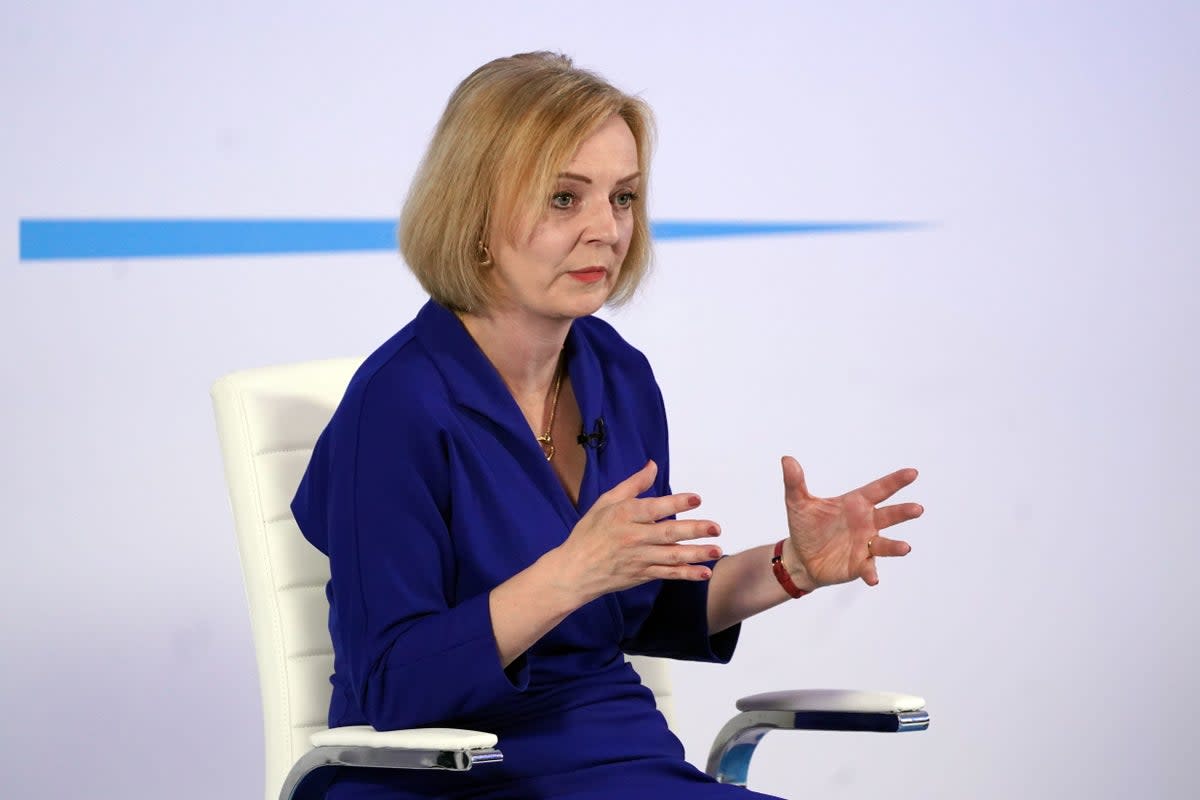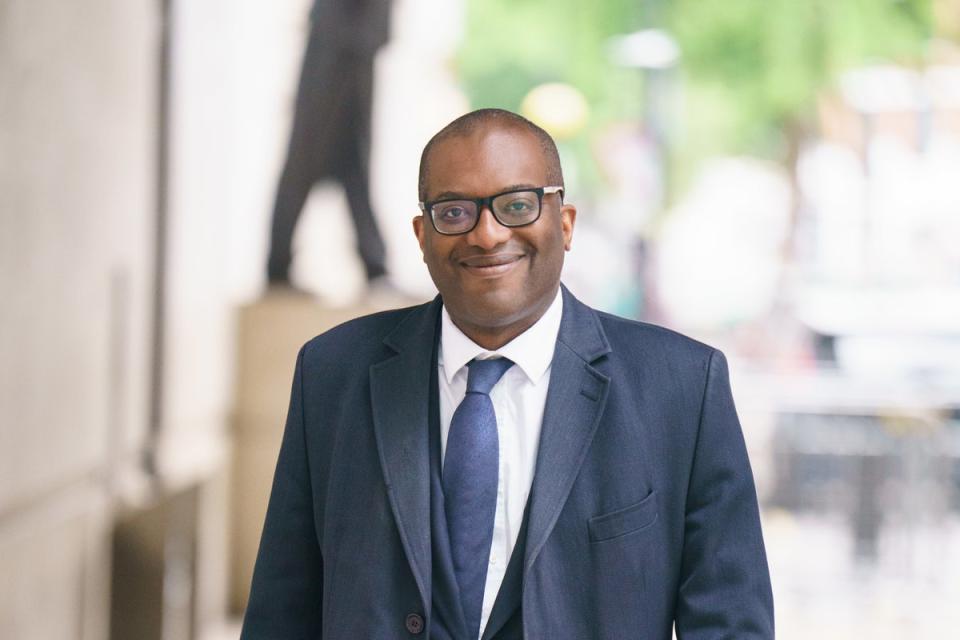Liz Truss ‘strongly considering freeze for energy bills due to economic squeeze’

Liz Truss is strongly considering freezing energy bills in a bid to ease the burden on households this winter, according to reports.
The Foreign Secretary is widely tipped to win the Conservative leadership contest on Monday, before being handed the keys to Number 10 the following day.
Having made tax cuts a key priority during her leadership campaign, Ms Truss had remained tight-lipped about what kind of support package she might introduce as the UK faces the prospect of soaring energy bills and a worsening cost-of-living crisis.
But reports in The Daily Telegraph and The Times on Monday suggest she is likely to introduce an energy bills freeze in some form.
The Times reports the package could be on the scale of the furlough scheme introduced by then-chancellor Rishi Sunak when the Covid-19 pandemic struck, while The Telegraph suggests the specifics of such a policy are still being debated.
Ms Truss had used an interview on the BBC on Sunday to insist that she would within a week reveal fresh help for struggling households, but repeatedly declined to spell out what those support measures might look like.
“Before you have been elected as prime minister, you don’t have all the wherewithal to get the things done,” she told the Sunday with Laura Kuenssberg programme.
Voting is now closed 🗳
Thank you to all my colleagues, campaign team and, of course, all the members who came out to meet me and lend your support.
See you Monday! #Ready4Rishi pic.twitter.com/i9vMZYSFdT— Rishi Sunak (@RishiSunak) September 2, 2022
“This is why it will take a week to sort out the precise plans and make sure we are able to announce them. That is why I cannot go into details at this stage. It would be wrong.”
It comes as Kwasi Kwarteng, widely tipped to be the next chancellor if Ms Truss is successful on Monday, used an article in the Financial Times to stress that the next Government will behave in a “fiscally responsible” way.
Mr Kwarteng, the current Business and Energy Secretary, appeared to try to address concerns about Ms Truss’s tax-cutting strategy, which rival Mr Sunak warned would only worsen the grim economic situation facing the UK.
Mr Kwarteng said there will be “some fiscal loosening” in a Truss administration to help households through the winter, stressing that it is the “right thing” to do.

He said the UK does not need “excessive fiscal tightening”, pointing to the UK’s ratio of debt to GDP compared with other major economies.
“The OECD has said that the current government policy is contractionary, which will only send us into a negative spiral when the aim should be to do the opposite. But I want to provide reassurance that this will be done in a fiscally responsible way. Liz is committed to a lean state and, as the immediate shock subsides, we will work to reduce the debt-to-GDP ratio over time,” he wrote.
Mr Kwarteng, a close political and ideological ally of Ms Truss, offered a vision for how he would operate the Treasury as he said the next government will be “decisive and do things differently”.
“That means focusing on how we unlock investment and growth, rather than how we tax and spend. It is about growing the size of the UK economy, not burying our heads in a redistributive fight over what is left,” he wrote.
His comments directly echoed those of Ms Truss on Sunday, as she insisted that her plan to reverse the rise in national insurance is “fair” despite it directly benefiting higher earners.
She told the BBC “growing the economy benefits everybody” and it is “wrong” to look at everything through the “lens of redistribution”.
But a senior economist warned that her vast tax-cutting plans would further fuel inflation.
Paul Johnson, director of the Institute for Fiscal Studies, argued that “simply cutting taxes … is not a strategy for growth” and that “pumping a large amount of money into the economy” would “lead to not just extremely high borrowing in the short run, but also additional inflationary pressure”.
Labour sought to accuse the Tory leadership candidates of stealing their idea to freeze energy bills.
Shadow justice secretary Steve Reed told BBC Breakfast on Monday: “It’s extraordinary that one of them will walk into Downing Street today with no idea what they’re going to do to help people. Now Labour’s winning the battle of ideas here.
“They could do a lot worse than U-turn on what they’ve said in refusing help to families and look at what we’ve proposed and adopt it, as they have many times this year.”
As Prime Minister, I will unleash Britain’s potential by going for growth and removing the obstacles holding our country back.
A growing economy is key to delivering for the British people and unlocking opportunity.
My piece in @Telegraph 👇https://t.co/agfTaq78R5 pic.twitter.com/3AUkw6aqZ5— Liz for Leader (@trussliz) September 4, 2022
Tory grandee Sir Geoffrey Clifton-Brown urged his party to support whatever plan the next prime minister announces.
“I think what the public want to see is a government delivering on their behalf in every respect, and, above all, having a plan to deal with this very serious situation,” he told BBC Radio 4’s Today programme.
“And I would hope that all my colleagues when Liz Truss or Rishi Sunak, whichever of the two of them it is, announces a plan, that they will get behind it and support it.”
The announcement of the next Conservative leader is scheduled for around 12.30pm at the QEII Conference Centre in central London on the same day Parliament returns.
Both candidates have spent the last several weeks traversing the country and taking part in hustings in a bid to win over the 200,000 party members charged with choosing the next Conservative leader.
The winner will emerge as the third Conservative prime minister since 2016, when David Cameron quit after losing the Brexit vote, and will oversee a party that remains bitterly divided about the legacy of Mr Johnson and its future direction.
Voting closed last Friday and the contest will draw to an end when the formal announcement is made by Sir Graham Brady, chairman of the 1922 Committee of Conservative backbench MPs.
The new leader is expected to make a speech following the announcement, before spending the rest of the day finalising their choices for Cabinet and wider ministerial roles and writing their first prime ministerial speech.
Ms Truss is facing calls to appoint Cabinet members from all wings of the party if she becomes prime minister.
“If you’ve got a very broadly-based cabinet – so, accounting for people, not just people who have supported the winner – then that’s most likely to have a unified and cohesive parliamentary party,” former chief whip Mark Harper, a supporter of Mr Sunak, told Sky News.
Once the result of the contest is known, Mr Johnson and his successor will go to Balmoral, rather than Buckingham Palace, for the appointment of the new prime minister on Tuesday, in a break from tradition.
Described by allies as likely to be a “very sad” occasion for the outgoing prime minister, the Queen will receive Mr Johnson on Tuesday at her Aberdeenshire home, where he will formally tender his resignation.
This will be followed by an audience with the new Tory leader, where she or he will be invited to form a government.

 Yahoo News
Yahoo News 
